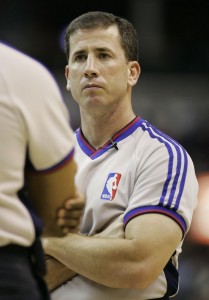Pro wrestling is fake, but what about real sports?
By DERON SNYDER
The term “suspension of disbelief” usually refers to works of fiction. We’re expected to shelve any concerns about the plausibility of novels, movies and plays, in order to engage with the art form and enjoy the experience.
Pro wrestling is a perfect example. Fans – at least the sane ones – accept the fact that it’s not real.
But when the subject is major sports, we must suspend a different sort of disbelief.
We thwart suggestions that proceedings aren’t on the up-and-up. We reject the notion that league officials manipulate outcomes for the sake of bigger markets and better ratings. We discount the idea that referees and umpires bend contests one way or the other for personal financial gain.
At least that’s how most of us like to consider the multibillion-dollar sports industry.
Everyone else – especially the conspiracy theorist – believes we’re incredibly naïve.
We shudder at the thought that skeptics might be right and a recent New York Times investigation makes us wonder. Thankfully, the sport in question is “only” soccer, plagued by corruption for years and not nearly as popular in the U.S. as football, baseball and basketball.
But the NYT’s detailed look at match fixing prior to the last World Cup shows how easily professional gamblers can dictate what happens if they get their hooks in people.
We’re not totally ignorant of the possibilities.
It’s old news that several players on the 1919 Chicago White Sox accepted bribes to intentionally lose the World Series. It’s common knowledge that point shaving has been an issue in college basketball since at least the early 1950s, with cases as recently as 2010. It’s understood that several University of Toledo football and basketball players pleaded guilty to point shaving in the mid-2000s, including a halfback who admitted accepting $500 to fumble in a bowl game.
And it’s impossible to forget about Tim Donaghy, the disgraced NBA ref who in 2007 pleaded guilty to betting on games and sharing inside information with pro gamblers. In court documents – and later in his book, “Personal Foul: A First-Person Account of the Scandal that Rocked the NBA” – Donaghy alleged that the league uses referees to dictate game results.
He was back at it recently in the first round of the playoffs. “(The Raptors) are not only going against the Brooklyn Nets but going against the league office,” he said in a radio interview in Canada, according to Fox Sports. “A Brooklyn-Miami matchup (in Round 2) would bring great ratings and that’s what this is all about for the NBA and the league offices – bringing in as many dollars as they can.”
Despite repeated protestations from former NBA commissioner David Stern, the league certainly prefers Finals with major-market teams opposed to, say, Memphis-Toronto matchups. At the very least, the preference is major stars (Kevin Durant) if smaller markets (Oklahoma City).
It’s only natural that leagues would want the most appealing and potentially lucrative pairings.
But it’s troubling to believe headquarters would order game officials to flimflam certain teams if necessary. That’s worse than unscrupulous athletes or referees who become linked with wise guys and strapped with gambling debts.
Most of us couldn’t care less about undetected point shaving as long as it doesn’t affect the overall outcome. Only gamblers stand to win or lose based on the point spread, over/unders, etc.
However, we all lose if we can’t trust the legitimacy of victory and defeat, when “the fix is in” and Team B beats Team A due to external forces. That’s a totally different story than who covered and who didn’t.
It’s doubtful that a “match-rigging syndicate” like the one described in the NYT could exist here. The paper’s investigation highlights a company that supplied the South African Football Association with allegedly crooked game officials. The existence of accomplices within the government organization is highly probable.
Unfortunately, not much can be done to prevent a Donaghy, a Quinton Broussard (the Toledo RB with intentional butterfingers) or other rouges from going lone wolf and compromising the integrity of our favorite sports. Education programs, stiff penalties and intense scrutiny are the only possible weapons, and they’re a porous defense against the criminal minded.
Ideally, nothing but honest, all-out effort takes place in our games. If there’s some point shaving going on – some dropped TD passes, missed free throws, booted ground balls and blown calls – so be it. Let the fantasy players complain while the gamblers rejoice.
But if any of those things – or league interference – alter the end result in the won-loss column, that’s totally unacceptable.
We might as well watch pro wrestling.
 Follow
Follow

